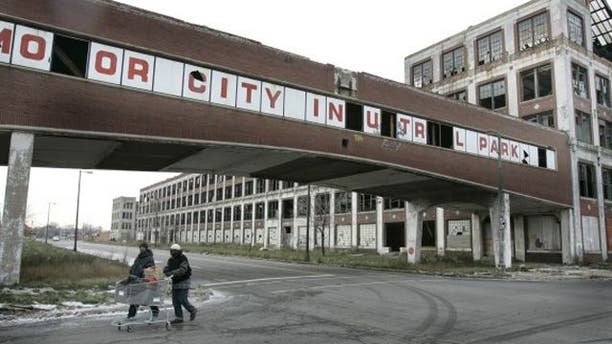DETROIT – The Obama administration has found $100 million to send to struggling Detroit, despite recurring claims that the government cannot afford to make any more spending cuts.
House Democratic Leader Nancy Pelosi claimed just last weekend that "there's no more cuts to make." Pelosi made the comments in response to Republicans demanding additional cuts in exchange for raising the debt ceiling.
"The cupboard is bare," she told CNN.
Apparently not completely bare.
Gene Sperling, chief economic adviser to President Obama, told the Associated Press the administration scrounged through the federal budget and found untapped money that "either had not flowed or had not gotten out or not directed to the top priorities."
That money is now being sent to Detroit.
Considering the Motor City is at least $18 billion in debt, it will take a far larger infusion of cash or historic deals with bond holders, insurance companies and other creditors to correct the problem.
But the $100 million infusion is a step toward greater federal involvement.
Sperling and three other top Obama aides -- U.S. Attorney General Eric Holder, Transportation Secretary Anthony Foxx and HUD Secretary Shaun Donovan -- were meeting Friday with state and local officials. The meeting was to include Gov. Rick Snyder, state-appointed emergency manager Kevyn Orr, Mayor Dave Bing and community and business leaders.
The federal money being directed Detroit's way by the U.S. government will be augmented by millions of dollars more in resources from foundations and Detroit businesses
The Obama administration repeatedly had signaled it would not offer a massive federal bailout like the one credited with helping rescue Chrysler and General Motors.
"There is not going to be a bailout," Democratic U.S. Sen. Carl Levin told The Associated Press on Wednesday. "We have enough problems with the federal deficit. We need to be creative and look at existing programs. There are still some funds there."
The funding announced by Sperling will include $65 million in Community Development Block Grants for blight eradication, $25 million in a public-private collaboration for commercial building demolition and nearly $11 million in funds to ensure working families can live in safe neighborhoods.
Holder will announce $3 million that, in part, will be used to hire new police officers. About $25 million also will be expedited to Detroit to hire about 140 firefighters and buy new gear.
"It wasn't enough to try and free the resources," Sperling said. "We had to make sure they are well-used and targeted."
In addition, Orr, the city's emergency manager, has told the city's two municipal retirement systems he wants to freeze Detroit's pension plans and move to a 401(k)-style system.
The gathering Friday follows a series of meetings with the White House to plot ways to pull Detroit from a fiscal pit that this summer made it the largest U.S. city to file forbankruptcy protection .
Detroit has had a poor record in making sure grant money is used properly and even spent at all.
In 2011, Mayor Dave Bing fired the director of the city's Human Services Department after an internal investigation revealed $200,000 intended for poor residents was spent on office furniture for staff members.
The following year, his office had to scramble to use about $20 million in grants that had been left sitting for demolitions of thousands of vacant houses. The city's Police Department also allowed a $400,000 grant to lapse for a new armored vehicle.
The grant troubles have rankled Orr, the emergency manager Gov. Rick Snyder appointed to lead the city out of its financial mess.
Orr has said Detroit is so poor that it can't afford to lose out on any resources. In July, he made Detroit the largest U.S. city to file for bankruptcy protection.
Grants only can pay for things the city otherwise couldn't afford. Several businesses even pitched in $8 million earlier this year to help pay for a new fleet of emergency vehicles, including 23 EMS units and 100 police cars, to boost public safety and reduce response times.
Police Chief James Craig said Thursday that he was in Washington a few weeks ago in search of federal resources for his department.


No comments:
Post a Comment